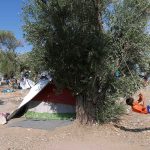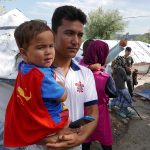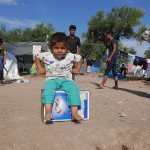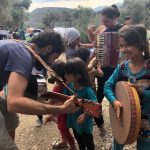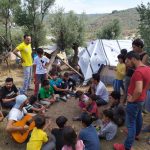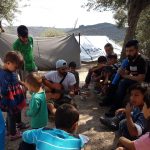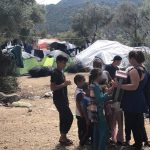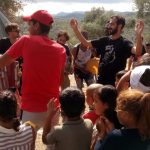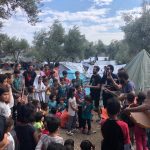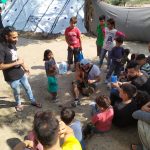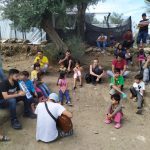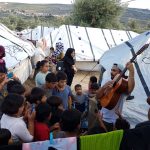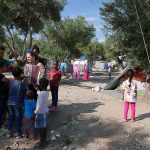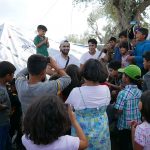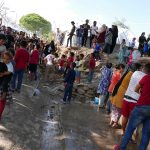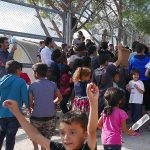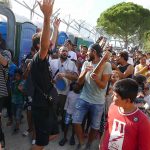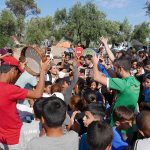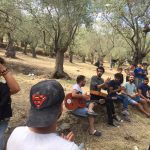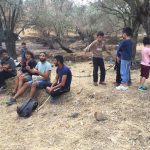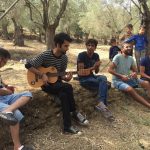The olive-grove besides Moria hot spot is huge. More then 13.000 people are stuck under horrible conditions inside and outside the monstrous hot spot prison Moria. In the olive grove, the informal camp behind the official one, the tents with plastic-covers grew to an own village. With several self-constructed bakeries, street vendors selling vegetables and other stuff along the main street, barbers and various other small businesses… Everywhere dust and the smell of wet clothes, electricity cables, paletts of wood. Overcrowded and hard to imagine and to describe, if you did not see and smell and feel it live. Everywhere children in all ages. Most of their time people spend cueing for food, water, showers, toilets, clothes – and waiting and hoping for a chance to get a transfer to the mainland to finally continue their journey.
And then there is the sound of music. Appearing first in one corner within the tents. Then in the next and in the next… Small groups walk up the hill, mixed teams of musicians and people making connections and chatting in various languages. Many among us who crossed this rocky path before three years, before 10 years – remembering and feeling shared pain with the ones now here. Moving among the tents; through the tiny roads jumping over ropes. Stopping, being invited for tea. Meeting friends from the days before and meeting relatives. And then starting to play, to bring people together. We want to share this moment in which you can just forget for some minutes this whole shit. In teams as mixed as our group to show that solidarity has no borders.
The kids understand it immediately: “You know `hurriya´? No Moria – we want hurriya, freedom,” is what a small boy says when we walk a while together. A family father tells us how important it is to see the different communities dancing together, while only yesterday he saw a fight in front of his tent. An afghan lady, grandmother of a family here with three generations expresses her joy: “My heart is growing in this moment of joy to see all of you together and to hear this music. It is becoming big enough to go on and to know I can reach everywhere.”
The idea for this music-flashmob around the hot-spot of Moria was born with the restless question how to act under these conditions when the islands became big prisons and no form of protest seems strong enough to change it. Even when Moria burnt down several times, even after hundreds of protests, the islands were still kept closed. Governments changed, but freedom of movement for everyone never was considered an option. Instead the infamous “EU-Turkey ´Deal´ built more walls, enforced more deportations. Back under a right-wing government, nowadays things get even worse. We have seen revolt after revolt – and also a lot of violence among the people when the pressure on the people held under inhuman conditions was so much that daily problems could cause huge conflicts.
When musicians and friends finally gather all on the top of the hill, the crowd dances together and then starts to move. We walk down the hill, singing songs and playing rhythms about freedom in all of our languages. There is a moment when the beat starts growing, we reduce the speed. The sleeping anger and the desperation are too strong and we feel it is not the right moment to get louder. But we can all feel it, this sleeping lion of anger and the natural strive for freedom to break the chains, that is as old as oppression exists.
We invite everybody we meet to come together for a festival the next day. Because today we will continue. We will break isolation and come together for a festival in the old olive factory near Panagiouda, a spot between Moria and the camp “Kara Tepe”. We will continue to share our thoughts and dreams and tell each other stories about these struggles – and we will dance to the rhythms for freedom for all to make our hearts strong enough to go on until freedom of movement is everybody’s right.
In the afternoon we sit together and share some thoughts and feelings about the day:
“First I went to visit my aunt and when I saw her together with her family stuck in these miserable condition it was a shock for me. I wanted so much to get my relatives out of there or at least improve their situation there. Many of us have family members and friends in the camp in Lesvos. And then I looked around and saw all the others, in even worse conditions because they had no one to visit them – and in this moment I felt so powerless and scattered. It feels so huge the problem.”
“When I went up the hill of Moria-camp I was remembering so much the time when I had been arriving and was stuck in Samos. My mind was full of memories – also of so many bad moments. And I could really feel the people. And I told them: ´I am one of you, just some steps further.´”
“I saw the camps on the Aegean islands the first time when I was working as a translator as I arrived from the land. Working for this organisation inside a hot spot, it was forbidden for us to be in contact with the people – even to say hello on the street. And now this was the first time to be able to talk and to just behave like normal human beings with each other – a relieving experience.”
“I was playing music for many times in camps on the greek mainland. Again and again it is shocking that I am often the first greek person the people meet and speak to. It feels like a huge hug when people in poorest conditions invite you to sit with them. I felt this here again.”
“My first experience of the day was to be forced to queue again like in the past when waiting for my permit to leave the island by boat from EASO – which is one of the crazy ways to try to control us. Even when we are allowed to travel, with our asylum seeker cards they put us again in this dehumanising situation of queuing and feeling powerless, just waiting for being accepted or denied. I thought I give a shit on your decisions, in the worst case I will just stay with the people. And then we started playing music. And I forgot all this horror immediately. It was the first time when I was not only playing music but also singing in Farsi since I arrived in Greece in 2016. I think I did it because it felt so normal at this shared moment. Not like a music-show, but I was singing with my people, my family.”
“The moments of music we shared are a message by themselves. A message of freedom. But we need to move on more steps, come back and do it again, so that the moment of freedom turns into a condition of freedom, where the imagination overcomes the repression and one can dream and hope again.”

